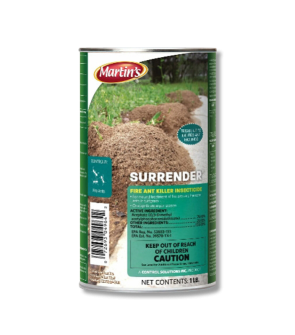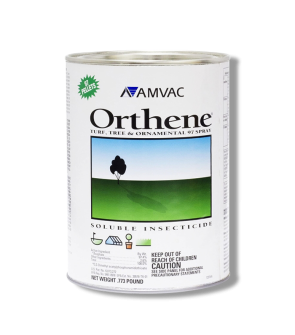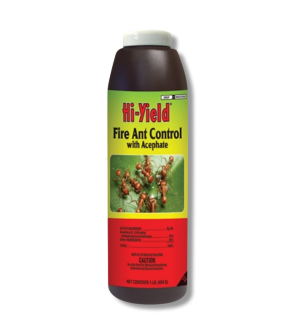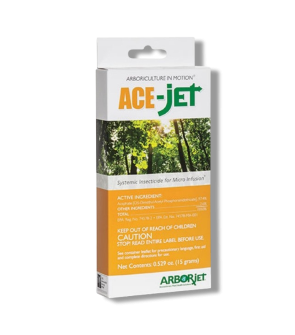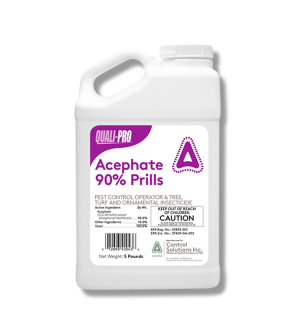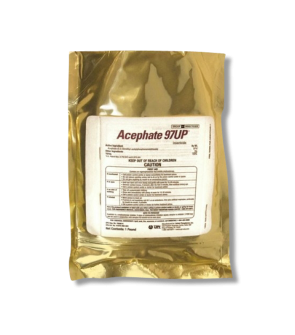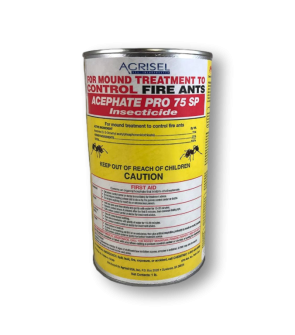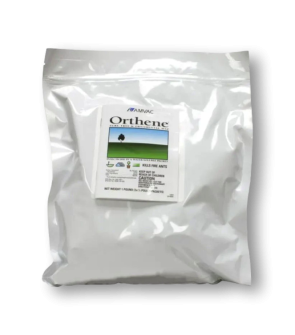Gain access to personalized product screening, the best pricing, rewards, and more!
Most Effective Products
Acephate
Acephate is the main ingredient for an assortment of insecticide products in our Solutions Pest & Lawn inventory. This active ingredient is known to be an effective product that controls several common pests encountered in homes, including, but not limited to, turf and crop-invading pests, ants (particularly fire ants), cockroaches, crickets, firebrats, silverfish, earwigs, pillbugs, wasps, pantry-invading pests, and others.
Here, you can shop for all our products containing Acephate in one place and learn more about this effective active ingredient, including its definition, mode of action, and other background information.
What is Acephate?
Acephate comes from the Organophosphate family of chemicals and is popularly used in the agricultural industry to protect vegetables, natural products, berries, cotton, tobacco, and herbs. It is also utilized in agriculture and commercial pest control.
Acephate provides systemic control in plants with a long-lasting residual. Acephate is formulated as granules that dissolve quickly in water to form a spray solution. It is also available as an aerosol formulation for controlling cockroaches and other structural pests and a granular insecticide for fire ant and harvester ant control.
How Does Acephate Work?
Mode of Action
Acephate is an organophosphate insecticide. The chemical works by blocking an enzyme in the nervous system, thus interrupting the essential processes that help the insect communicate with muscles and other nerves. As a result, the affected insect experiences a build-up of the chemical acetylcholine. Eventually, the accumulation of acetylcholine in the muscles causes overstimulation, which can result in the insect being paralyzed or dying.
Benefits of Acephate
Acephate is a low-toxicity product that provides good residual control of a wide variety of insects. It usually comes in powder form and is easy to mix and apply. Some Acephate-based products come in measured packets, which make the mixing process simple.
Acephate is best used in warehouses or agricultural settings to treat insect infestations.
Drawbacks of Acephate
Acephate has a characteristically strong odor (primarily from mercaptan, a by-product in the production of Acephate). However, some successful attempts have been made to improve the formulation to reduce the strength of the odor.
Avoid using Acephate if you are sensitive to strong odors.
How To Use
Acephate usually comes in a ready-to-use bait formulation, or it can be mixed with water in a pump sprayer. It could also come in granule form and would have to be applied using a granular spreader or a special container.
Aside from being used in baits for residential and commercial pest control, acephate is used by the agricultural industry to control insects and mites on a wide variety of crops: citrus, pears, alfalfa, nut trees, cotton, vegetables, and ornamentals.
Spray Application

First, measure your yard's square footage to determine how much of the Acephate-based product you need. Following the label instructions, mix the appropriate amount of the Acephate product into your selected sprayer with water and then apply the product to the areas where you wish to treat insects.
Bait Application
Following label directions, apply the bait strategically in areas where your target insects are active or where they frequent.
If the Acephate bait comes in granular form, you may need a spreader to apply the product or can shake it out of the container it comes in.
Is Acephate Safe?
Acephate is regarded as a general-use pesticide, meaning that it can be used by the average homeowner, not just by professionals. This is a solid indicator that it is safe to use. When applied to plant life, Acephate breaks down quickly in the environment as it is absorbed from the soil by plant roots. Subsequently, the roots transport the Acephate to other parts of the plant, causing little residue on food and in drinking water.
The EPA has declared that those residues do not pose any risk and are not injurious to health. Acephate emits toxic fumes of phosphorus, nitrogen, and sulfur oxides when heated to decomposition. It is recommended that when applying Acephate (or any other chemical product for that matter), you always wear protective gear such as a mask, gloves, long-sleeved clothing, etc. Wash clothing and skin thoroughly when the application is complete. For safety reasons, it is essential to consistently apply the product according to the instructions on the label.
What To Expect
As a general-use insecticide, Acephate has a residual effect of 10-15 days. Insect pests are generally controlled more effectively by Acephate through ingestion than by contact. Acephate does not deliver an instant kill, and it may take several minutes or longer for a pest to succumb to the active ingredient.
Featured Products
Surrender Fire Ant Killer - Surrender Fire Ant Killer is a systemic insecticide used to treat fire ant infestations. This can be sprinkled as dust over ant mounds for simple and effective control.
Acephate 97UP Insecticide - Acephate 97UP provides reliable contact and systemic control of a wide spectrum of sucking and chewing insects used primarily to protect crops and in certain non-agricultural areas.
Orthene PCO Pellets—Orthene PCO Pellets are mixed with water to create a powerful insecticide. This product contains 97% Acephate and is used primarily in restaurants to treat German cockroaches when baits are ineffective.







